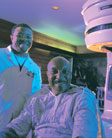 
Prostate
Puzzle
(continued)
Passion
for prevention
Radiation oncologists, extensively trained in the safe use of radiation
to treat cancer, typically are not involved in population and prevention
studies.
But Vijayakumar is not a typical radiation oncologist. He was the
only radiation oncologist among the more than 90 principal investigators
in the Prostate Cancer Prevention Trial. A national trial with nearly
19,000 men participating, the PCPT seeks to determine whether the
drug finasteride can prevent prostate cancer.
Vijayakumar was also the lone radiation oncologist tapped as a principal
investigator for the African-American Hereditary Prostate Cancer
Study, a national effort to gather blood samples from black men
with family histories of the disease in hopes of identifying responsible
genes.
Vijayakumar’s newest research project also focuses on prevention.
Funded by the U.S. Department of Defense Prostate Cancer Research
Program, the new study will assess whether vitamin D can prevent
cancer recurrences in men who have completed radiation therapy for
prostate cancer.
A way to prevent prostate cancer may be a long way off. But Vijayakumar
thinks methods of postponing prostate cancer — keeping it
at bay for five or 10 years — may be within reach.
“Postponing prostate cancer could have a real impact,”
he says. “If we could delay the average age that a man gets
prostate cancer, from age 67 to age 77, that would be a good thing.”
  

Home |
Table of Contents |
To our Readers |
Building on Basics
Focusing on Patients |
In Translation |
First Steps
Campus Connection |
Benefactors |
News in Brief
UC Davis Health System |
© 2000, 2001, 2002 UC Regents. All rights reserved.
|
 |



 

Radiation
therapist Tomain Murphy, left, is a member
of prostate cancer patient Joseph McCray's multidisciplinary treatment
team. |


